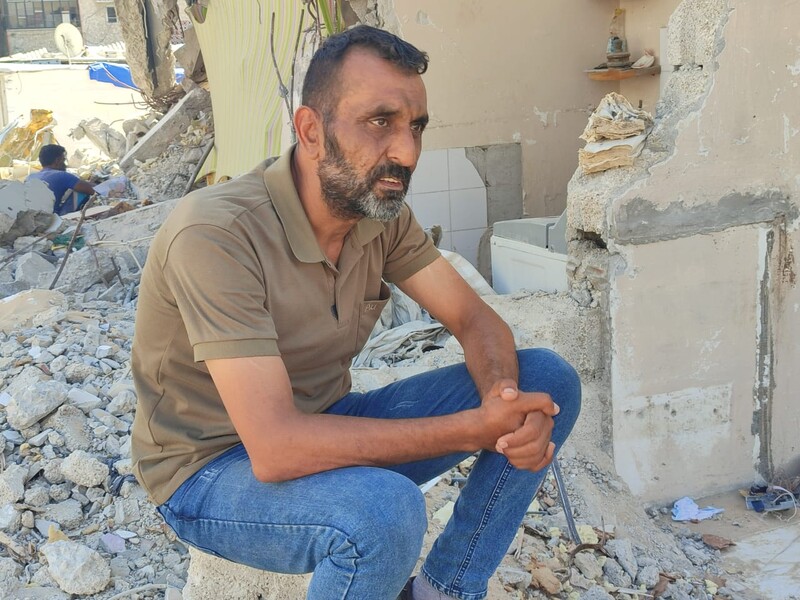The Electronic Intifada 22 August 2024

Nael al-Najjar, 47, was in Israeli prison for 20 years, since 2003, and he was set to be released on 17 October 2023. His release was delayed by Israel until July 2024.
The Electronic IntifadaNael al-Najjar, 47, was set to be released from Israeli prison on 17 October 2023, what he called “freedom day.”
He had been in prison for 20 years, since 2003, and he had a lot to look forward to when he returned home to the Jabaliya refugee camp in northern Gaza.
“My relatives were excited to receive me and celebrate me,” he said.
He envisioned for himself a “care-fee and happy life, enjoying all the feelings of love and freedom among my family and loved ones.” Once released from prison, he believed that he could finally “forget all the years I lived in captivity when I took my first breath outside.”
He also had a fiancee, his cousin Hanady, whom he loved dearly.
“She had waited for me for 13 years since our engagement was announced,” Nael said, “and she was looking forward to the day we met.”
“She told me that she wanted us to celebrate our wedding on the same day that I would be released from prison.”
Hanady was already decorating the home that they would share together. She told him “all the details and how she carefully chose the furniture for the house. She said she bought me a love bird and placed it in our house.”
A house, a wedding, his father’s embrace, sitting under the grape vines at his family’s home. These were the things Nael dreamed about in prison.
Yet on 7 October, 10 days before his anticipated release, he said he “felt very afraid for my family and I was communicating with them to check on them.”
“I was following the horrific news and scenes happening in Gaza,” he said, “and I became worried about the fate of my family.”
“Wherever you go, you will face your fate”
Nael said that after 7 October, Israeli prison authorities adopted even more punishing behavior against prisoners, including medical neglect, malnutrition and torture.
His release date came and went, but he remained in prison.
“I was afraid they would forget my release date,” he said.
While still in prison, he received a call from his father on a smuggled phone. Nael told him to go south for safety, but his father refused.
“He told me that he could not leave the house and that we Palestinians must not surrender to the policy of displacement and must remain steadfast.”
His father told him, “Wherever you go, you will face your fate.”
He also talked to his fiancee Hanady.
“She told me that she was afraid and said that she felt like she was going to die, as the bombing did not differentiate between anyone.”
Hours after that call, on 1 November 2023, he received news from other prisoners that everyone in his family’s home had been martyred by an Israeli strike.
Ten people from his family, including his father, fiancee, aunt and cousins, were martyred.
He was in shock and did not understand what had happened.
“This scene was never in my plans or in my worst nightmares,” he said.
The worst 7 months of his life
Over the next seven months in prison, he lost nearly 90 pounds.
“Those were the most difficult seven months” of his entire prison term, he said.
Finally, on 1 July, an officer retrieved him and told him that he would be released.
“They took me and a group of prisoners toward the Kissufim gate,” he said. “I did not recognize the place. I asked the officer where we were. He said that I should go that way to Deir al-Balah.”
He headed toward Deir al-Balah, running.
“I was afraid that one of the soldiers would catch me and take me back into captivity, or that we would be executed while we were on the way.”
He eventually contacted his brother to let him know that he had been released. He went to Nuseirat in the central Gaza Strip, where his surviving relatives had gone after the attack on their home.
“I couldn’t believe that I was outside the prison walls,” he said. “While I was wandering in the street, I saw the tragedy.”
The scale of destruction of Gaza by July was beyond anything he could comprehend, and it was painful to see all of the camps of the displaced.
“I often sit by myself and cry over everything,” he said. “I cry for my beloved, home, family and homeland. We paid with our lives and freedom to see a free Palestine.”
He is still displaced in Nuseirat, living with relatives.
“It is not easy for a person to lose everything while living his first moments of freedom.”
Fedaa al-Qedra is a journalist in Gaza.





